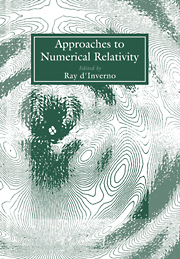Book contents
- Frontmatter
- Contents
- Contributors
- Introduction
- Preface
- PART A THEORETICAL APPROACHES
- Numerical relativity on a transputer array
- Some aspects of the characteristic initial value problem in numerical relativity
- The characteristic initial value problem in general relativity
- Algebraic approach to the characteristic initial value problem in general relativity
- On hyperboloidal hypersurfaces
- The initial value problem on null cones
- Introduction to dual-null dynamics
- On colliding plane wave space-times
- Boundary conditions for the momentum constraint
- On the choice of matter model in general relativity
- A mathematical approach to numerical relativity
- Making sense of the effects of rotation in general relativity
- Stability of charged boson stars and catastrophe theory
- PART B PRACTICAL APPROACHES
- PANEL DISCUSSION
On the choice of matter model in general relativity
Published online by Cambridge University Press: 15 December 2009
- Frontmatter
- Contents
- Contributors
- Introduction
- Preface
- PART A THEORETICAL APPROACHES
- Numerical relativity on a transputer array
- Some aspects of the characteristic initial value problem in numerical relativity
- The characteristic initial value problem in general relativity
- Algebraic approach to the characteristic initial value problem in general relativity
- On hyperboloidal hypersurfaces
- The initial value problem on null cones
- Introduction to dual-null dynamics
- On colliding plane wave space-times
- Boundary conditions for the momentum constraint
- On the choice of matter model in general relativity
- A mathematical approach to numerical relativity
- Making sense of the effects of rotation in general relativity
- Stability of charged boson stars and catastrophe theory
- PART B PRACTICAL APPROACHES
- PANEL DISCUSSION
Summary
Abstract. Criteria are presented for choosing a matter model in analytical or numerical investigations of the Einstein equations. Two types of matter, the perfect fluid and the collisionless gas, are treated in some detail. It is discussed how the former has a tendency to develop singularities which have little to do with gravitation (matter-generated singularities) whereas the latter does not seem to suffer from this problem. The question of how the concept of a matter-generated singularity could be defined rigorously is considered briefly.
INTRODUCTION
In any investigation of the Einstein equations it is necessary to make some assumptions about the energy-momentum tensor. One possibility is simply to require that some energy conditions be satisfied. (In that case it might be more appropriate to say that the object of study is the ‘Einstein inequalities’.) Despite the fact that this is sufficient to obtain important results including the singularity theorems and the positive mass theorem, it is very likely that there are significant results concerning the qualitative behaviour of solutions of the Einstein equations which require more specific assumptions. In any case the choice of a definite matter model is indispensable for numerical calculations and for analytic work based on the use of a well-posed initial value problem. The particular kind of matter chosen will of course depend on the problem being studied.
- Type
- Chapter
- Information
- Approaches to Numerical Relativity , pp. 94 - 102Publisher: Cambridge University PressPrint publication year: 1992
- 1
- Cited by



